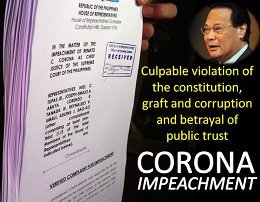Some Questions About Corona Impeachment
The Senate impeachment trial of Chief Justice Renato Corona started last Monday, January 16, 2012. Now on its fourth day, the proceedings is currently the most watched event in the country. The Philippine broadcast, print and online news media are all closely monitoring the developments in the Monday to Thursday afternoon to early evening hearings where the Congressmen-prosecutors with the help of private lawyers are doing their bests to prove their charges against the Chief Justice.
Actually, the CJ Corona impeachment trial is the second such proceeding that I will have the chance to watch closely via live broadcast on television. The first was the 23-day trial in late 2000 and early 2001 of the then President Joseph “Erap” Estrada on charges of bribery, graft and corruption, betrayal of public trust and culpable violation of the Constitution. It is now in our history books that the Erap impeachment trial was cut abruptly by the walk-out of the Congressmen-prosecutors.
During the Erap trial, we were given the chance to learn what impeachment is and how the trial of an impeached official is done. However, in view of the so many legal terms being used in the impeachment proceedings, the non-lawyers among us need to be guided on what those terms mean. There are many primers available online about the Corona impeachment that could help us understand more about the proceedings. Personally, I found the GMA News Primer on the subject very enlightening but there are still some common questions not included in it so I would like to tackle them here to the best of my knowledge.
The first question commonly asked to resource persons on TV coverage of the trial is “CJ Corona was already impeached by the House of Representatives so why is there an impeachment trial by the Senate?“. This question is answered by the clarification that the word “impeached” means “charged” or “accused” so an impeachment trial has to be conducted to prove or disprove the charges against CJ Corona.
“What is needed to convict CJ Corona and remove him from office?” is another question about the trial. The presiding judge of the Senate impeachment tribunal, Senator Juan Ponce Enrile answered this question in a very recent news article. He said the prosecutors need to present “clear and convincing evidence” to show CJ Corona’s guilt on any of the charges and he will be removed from his position.
One other question that is usually asked is “Can the Supreme Court issue a temporary restraining order (TRO) to stop the impeachment trial?“. To this, Sen. Enrile opined that the Supreme Court cannot stop Corona’s impeachment trial or interfere in the proceedings. He said Senate has the sole power to try and decide this case and once the impeachment court convened, no one can appeal for temporary relief like a TRO from the Supreme Court.





As an ordinary citizen, my observation is that he (CJ Corona) should better resign his post than answer the charges against him, for he has no clear objective, why he should continue this battle. If he wants that his name remains clear, just resign and leave the post. and be noble . . I really don’t know how he could clear his name with that so many charges against him; thru technicalities raised by his brilliant lawyers?
The cue word is “courtesy”, why not resign his post and leave to the present administration the burden of reforming our justice system. Anyway, he (Pnoy) is answerable to the people. Otherwise, how CJ Corona could perform his duty as Chief Justice (if he was acquitted) with still, at the back of the mind of every citizen that he is associated with FPGMA and that his credibility and integrity in question?
In short, if he resigns: a peaceful transition if he will be acquitted and continue to serve as CJ: apparent chaos!!!!!!!!!!!!!
Hi Tony,
Thank you for the visit and the comment. You said it right. The best thing we could wish is for CJ Corona to resign now. While I read somewhere that he will lose all of his separation benefits if he do so (he should have resigned before the trial if he wants to enjoy the benefits), he should consider resigning for his own sake and that of our country.